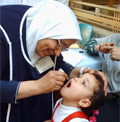 But few would have imagined that the ultimate success of the campaign would lie in the hands of groups such as ISIS, Boko Haram and the Taliban.
But few would have imagined that the ultimate success of the campaign would lie in the hands of groups such as ISIS, Boko Haram and the Taliban.
Until the 1980s, polio was killing and maiming millions of people in a diverse group of countries around the globe, each with its own political, geographical and economic challenges.
A map of polio-ridden areas read like a snapshot of global disadvantage: countries and regions with the least money, the worst infrastructure and the weakest governance were hit hardest.
But today, almost every child in the world has access to free polio vaccination, and local health workers, politicians, and religious and community leaders pro-actively encourage immunisation. The number of cases has plummeted by 99%.
Just a couple of years ago, polio was endemic in India but the country is now polio free. Nigeria is also on the verge of giving polio the boot.
Nigeria’s success has been hampered by Boko Haram in the north of the country but earlier outbreaks had been countered largely thanks to the intervention of Muslim leaders who quashed local vaccine conspiracy theories.
It is also worth noting that ISIS, despite what they have done to some humanitarian aid workers have in fact facilitated vaccine programmes in parts of Iraq and Syria.
High stakes
That leaves just two countries – Afghanistan and Pakistan – where the disease is still endemic. The worst affected areas are in mountainous regions where some of the hardest-to-reach people on the planet like in very difficult conditions.
Even getting accurate maps of the area has been a challenge for those trying to wipe out polio. The Gates Foundation brought in GPS technology to develop its own.
The final problem though is that polio eradication – a global good that would banish a disease that has plagued poor countries long after it disappeared from the West – is caught up in the most complex and deadly political issues.
The battle against polio has collided with what was once dubbed the ‘War on Terror’.

The Taliban, which operates in some of Pakistan’s worst-affected areas, ‘banned’ polio vaccination in 2012 in retaliation for US drone strikes. They have also killed health workers and others who deliver polio vaccines.
Alas, the suspicion with which some communities viewed international health agencies was only heightened when it emerged that the US Central Intelligence Agency had used an immunisation drive to collect DNA samples from the compound where it suspected Osama Bin Laden was hiding.
The Deans of the top US schools of public health were critical of the CIA for jeopardising a global health campaign.
Today, the issue remains fraught. In some Pakistani towns, immunisation drives have been postponed, attacks continue and hundreds of parents are being arrested for refusing to allow polio drops to be administered.
End game
The latest Polio Eradication and Endgame Strategic Plan 2013-2018 maps out the last miles on the road to a world without polio.
Whether the world is polio-free by 2018 could be decided by a tiny number of people in mountain ranges either side of the Pakistan-Afghanistan border.



